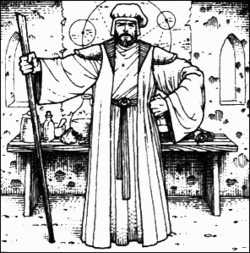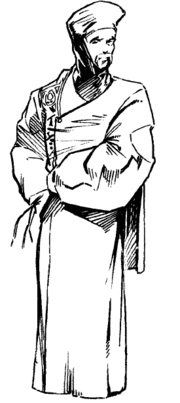Mage
| Mage | |
|---|---|
 Mage | |
| Magic ability: | full |
| Bonus: | high INT |
Mages are the profession in Britannia that associates the closest with magic.
The Way of the Mage[edit]
The magi of Britannia are known for their powerful spells and mesmerizing enchantments. Gathering in Moonglow, near the Lycaeum, there they study the ancient scrolls and arcane knowledge of the land in their unending quest to further the virtue of Honesty. Despite their erudite nature and frail frame compared to many stouter citizens of Britannia, the mage makes a powerful travelling companion and a dangerous adversary.
With little need for heavy armour or weapons to protect them from the dangers of the land, most mages choose to cloak themselves in simple cloth armour, and carry either a staff, dagger, or sling, although some have been known to carry more resilient fare when danger is expected. Some have even been known to carry powerful magical enchantments woven into their equipment. The primary weapon of the mage, of course, is magic. The most powerful mages have been known to bind enchantments which can cause the very earth itself to move.
Mages are among the older professions.
Statistics[edit]
In Ultima IV, the multiplier for mages’ magic powers is "2" (formula: (INT × X = MP)). The best normal armour they can wear is cloth and the best normal weapons they can wield are a dagger and a sling. The best magical weapon they can wield is the magic wand.
In Ultima V, mages are awared as much mana as they have INT. There are no more restrictions on armor and weapons, though the needed strength for many of these of course limits the selection to the mage, who generally has low STR.
No mages could join the Avatar’s party in Ultima VI.
In Ultima IX, the mage receives level 3 INT, +5 karma, Arms of the Magi, and a map of Moonglow as a starting bonus.
Examples[edit]
There have been many famous mages in Britannia's history throughout the ages, thus a complete list would be way too long. Some of the more famous ones are:
- Mariah, one of the Companions of the Avatar and the most famous mage.
- Nystul the royal magician.
- Nicodemus, who converses with the Time Lord and invented Knight’s Bridge.
- Penumbra, a mage living in Moonglow.
- Rudyom, a mage living in Cove.
- Wis-Sur, the gargoyle mage of Vesper.
- Temme, the sorceress of Farthing.
- Xiao, one of the greatest mages of her time.
Dishonorable mentions:
- Flain, mage working for the Oppression.
- Elistaria, sorceress of the Oppression using black magic.
Lore[edit]
| “ | The Magi of Britannia gather in Moonglow, near the Lycaeum, where they can study the ancient mystical scrolls of the Library. The strictures of their profession permit Magi to wear only cloth armour and carry either a staff, dagger, or sling. Unconfirmed rumors indicate that the highest Adepts have acquired the use of arcane magical weapons. The primary weapon of the Mage is magic. As the Mage becomes more advanced, more powerful spells can be woven. Some of the greatest spells have been known to shake the earth, or raise the dead! – from The History of Britannia (Ultima IV)
|
|---|
| “ | Mage is the title subsuming all Britannians endowed with full magic powers and for whom magic is primary. Mages tend to settle in Moonglow, enjoying its proximity to the scholarly and esoteric treasures of the Lycaeum; indeed, many youngsters who show magical learnings are sent to live with groups of mages near the Lycaeum and schooled in its ways from an early age. Others favor Yew for its emphasis on nature. Skill in magic requires serious study. With such sedentary childhoods, it is no wonder that most mages are not very strong. Do not, however, take that to mean they are not healthy; as a group, mages tend to live longer than any others. – from Book of Lore (Ultima V)
|
|---|
| “ | All well-traveled adventurers have at one time or another been mystified by the mages of Britannia. Never to be forgotten is the sight of a cloaked figure performing an odd dance in a distant clearing. Puzzling indeed is the whispered transaction between a mage and an apothecary as the magician acquires the plants and animal parts that are the raw materials of his trade.
Seeing what cannot be seen, hearing what no man hears, communing with beings not present... What ancient spirit possesses the mage that his mind constantly dwells on things not perceived by the common man? One never chooses to become a mage — one is born a mage, having from birth exhibited magical inclinations and abilities which defy rational explanation. A mage usually spends his early years studying the esoteric writings and diagrams contained in the libraries of the Lycaeum or poring over bottles and boxes of exotic herbs and minerals found in its laboratories. The tools and weapons of the mage are found in his spellbook, which never leaves his side. This tome is filled with pages of cryptic runes which describe the auspicious times, places and methods for various types of sorcerous work. The illusions and spells at the mage's command often cast him in the role of equalizer when a party of adventurers finds itself in an otherwise one-sided conflict against a megalithic foe. From a well-protected position at the edge of the battle, the mage makes the necessary preparations and utters the mysterious incantations to unleash the force of his chosen spells against an unsuspecting foe. Certain skilled mages possess remarkable power over nature and matter, being able to create and destroy living and inanimate things at will. The deeper secrets of the mage will be discussed later in this treatise — such secrets are not for the eyes of all men. – from Compendium (Ultima VI)
|
|---|
| “ | As with the fighters, wizards desiring to join our Colony must be ready to satisfy the entry requirements of a fraternal organization unique to the Abyss. This is our magical society, the Ancient Illuminated Seers of the Moonstone. Their by-laws encourage magic-users to shun armor except that made of cloth, and to carry no weapons beside staff, sling or dagger. (Arcane weapons are, naturally, excluded from this limitation.) However, no natural or magical law prevents spellcasters from using whatever armor and weapons they choose, and many of the younger Seers opt for the heaviest arms and armor they can manage. Still, the Seers' rules serve to keep the mage focused on his primary purpose: the working of magic. – from Memoirs of Sir Cabirus (Ultima Underworld)
|
|---|
| “ | A pity to those who live their lives following the treacherous road that is the way of the mage, now that the time of magic is coming to an end. The days of wonder, when miracles could be performed on demand through wisdom and a devotion to the arcane arts, are a part of the past. A mage’s mind perceives that which resides in the invisible world, but as recent history has shown us, but this keen mind upon which the mage depends is ever in danger of slipping into lunacy. What is also tragic is that the way of the mage is not one that is consciously chosen. One is born with the calling of the mage. While magic has not yet ceased to function altogether, it has become inaccurate to the point of being unreliable, making the mage's life one of constant uncertainty. – from The Book of Fellowship (Ultima VII)
|
|---|
| “ | Members of my own profession, the mages, devote themselves to the manipulation of magical forces to achieve their ends. Intelligence is the sine qua non of the magic-user, useful for learning and casting magic spells, and also for devising original ways to apply a familiar spell to a knotty problem. |
|---|
| “ | When I make my notes about spell-casting, I will better describe the true essence of mages and our craft. However, here I will simply list what makes a young person choose a profession in the mysterious and unforgiving world of magic. There is a saying among our kind: Mages are born, not made. This seems accurate, for those of us who pursue magic begin at an early age. I remember well my affinity for enchantments in my youth. My senses exploded with life, detecting the waves of ether before I was even old enough to know what ether was! Within a few years I had already started collecting reagents, finding the natural ingredients with uncanny ease. While not all wizards were that proficient so early in their lives, I have met precious few who claim to have learned spellcraft after mastering a previous trade. |
|---|
See Also[edit]
| The Major Professions | |
|---|---|
| The Professions | Mage ☥ Bard ☥ Fighter ☥ Druid ☥ Tinker ☥ Paladin ☥ Ranger ☥ Shepherd ☥ Avatar |
